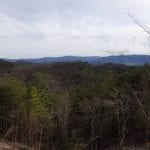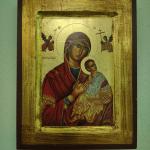They told me the prophet had been there by the riverside. Actually, the guide said two prophets stood there almost 900 years apart from each other. The Jordan was muddy here. It was not the clean waters in Galilee. The river is the lifeline of two nation-states today. And it boggles the mind to think about how many people over the centuries relied on it. This muddy river sung about by so many people who never saw it. The riverside that was often sung about as a metaphor for death. “On Jordan’s stormy banks,” I stood.
Riverside Prophets
The guide spoke, though, of the prophets Elijah and John the Baptist. Elijah departed from that area on a fiery chariot never experiencing death according to the Scripture. John went back to this end and began preparing the way of the LORD spoken of in second part of Isaiah. Is he building a bridge from this world to the next one? The gospel writers first deal with what John is not. He is not Elijah literally returned from Heaven. Nor is he the Messiah come down from the same place. John is the Voice in the Wilderness speaking comfort and crying out against evil.
John cries out against the evil of police officers (soldiers) who falsely accuse and extort money from the people. In crying out John comforts everyone who has experienced this. John tells tax collectors to stop overcharging and thereby profiting from similar extortion. Again, by doing this, he brings comfort to everyone who has been victimized. John demands people who have more than they need to give to those who need and have nothing. But John does not merely “afflict the comfortable and comfort the afflicted.”
John the Baptist is building the highway for Adonai. “For all shall see the salvation of the LORD.” He offers a baptism of repentance and demands restoration for wrongs committed. People are to prepare themselves for this salvation. John’s Gospel shocks most of us. He never predicts the End. He presents a road to travel.
Who Is This Guy?
Protestants never get a clear idea for John. Historically speaking, Baptists do not take their name from him. “Covenant Theology” usually casts John as the final Old Testament prophet. The implication is that John the Baptist does not really matter. Lectionaries mention him a only few times. We think of a wild man in the wilderness. Unfortunately, we are people of cities. We respond like the people in the cities did to John.
“If you are not Elijah, that prophet, or the Messiah, why are you baptizing?” In other words, what role in the narrative do you play? “We already know you are crying out in the wilderness. We came to you because you would not come to us. Why are we required to come out here to find the way of Adonai?” It was not for the quality of the water.
The voice in the wilderness calls us out to remember what matters. We see the man living off locusts and wild honey. The money extorted by tax collectors and soldiers is not useful out here. We see the prophet dressed in camel’s hair and a leather belt reminding us that coats are very important. One needs them for the walk back home in the evening.
The Riverside Listener
Church people easily forget that Jesus begins as one who heard John. He comes to the prophet for the baptism of repentance. Who is he to Jesus? Luke says they are cousins a few times removed. Beyond that, we merely speculate. Jesus took John’s message into the cities and towns. He heard in it his own work.
What about the person who heard nothing useful in John’s message? Is someone standing beside Jesus in the crowd and missing the point? The question that separates the sheep and the goats applies here. “When did we see you hungry or thirsty, homeless, imprisoned, or suffering from illness?” I imagine someone asking, “When did I tell your mother to sleep in the barn when she was in labor?”
Pastors should ask themselves difficult questions after we deal with people in need. I imagine John the Baptist in the corner of my study questioning me on what is really important. Have I done what I really should have done?
The next questions apply to all of us. Do we benefit from injustices heaped on others? Are we hoarding goods or money? The prophet in the hair tunic eating locusts and wild honey is listening to our answers. I am concerned about what he will say.












